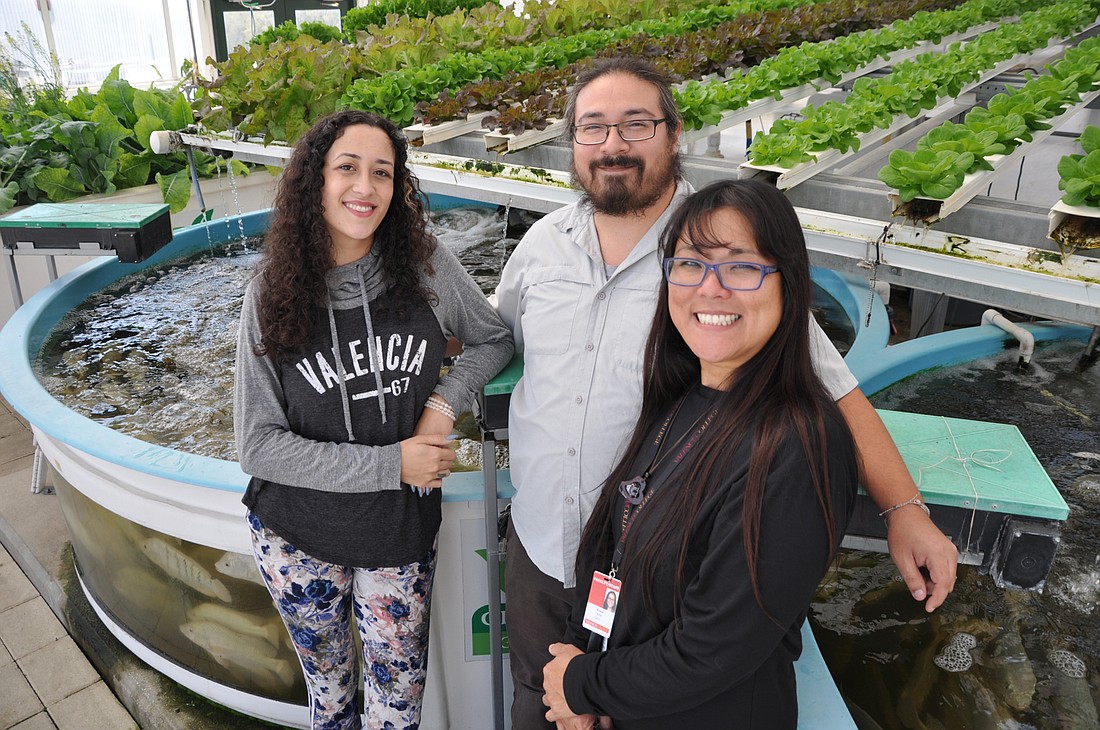- January 10, 2025
-
-
Loading

Loading

More than a decade after its creation, a greenhouse in the sky is still going strong.
Green Sky Growers by Valencia College is teaching the community about sustainable farming through its aquaponic and hydroponic systems on top of a three-story building in downtown Winter Garden.
The greenhouse is used by Valencia College as a teaching tool and classroom experience for students — not just within the college, but whoever wishes to learn more about sustainable farming.
“It’s definitely meant to be a showcase of, ‘Look what’s possible — look what you can do,’” Lab Supervisor Robby Pletcher said. “I try to reach out with middle schools and high schools and homeschoolers to bring the kids out and show them that this is the kind of stuff that you can do. … You’ll see a general sampling of people and some of the kids are like, ‘Oh, this is kind of boring,’ and then you have some of the other kids that are like, ‘This is amazing. I did not realize this was possible.’ That’s what we’re hoping — getting those kids to realize that Valencia is right here. They have the ability to take these classes and learn how to work in this type of environment.”
The greenhouse has changed hands over the years since it first was launched by citrus grower and inventor Bert Roper in 2009. The Roper Garden Building it sits on was constructed entirely with the intention of supporting the weight of the greenhouse. It was the first certified green building in the world with an aquaponic greenhouse on the roof, according to the Roper Garden Building website.
Every detail about the greenhouse and the building was meant to demonstrate suitability. Rain curtains on top of the structure channel the rain down into a cistern under the building, which is used for irrigation purposes in addition to the city’s water. All the growing systems continuously recycle 100% of the nutrients and water.
The greenhouse eventually was acquired by Valencia College, which runs its plant science and agricultural technology program from its West Campus off of Kirkman Road in Orlando.
Today, the greenhouse serves as a learning environment more than ever before, Pletcher said. The production of food has been cut down, with a stronger emphasis on teaching students and maintaining the equipment. Ornamental plants have been added in place of some of the produce, Pletcher said.
“We want the space to look nice for our students, for tours and for any higher-ups that come by. … We’re not a production facility; we’re not trying to grow as much as possible for as many people as possible,” Pletcher said.
A GLIMPSE OF THE FUTURE
The greenhouse showcases an aquaponics system. Fish kept in large tanks produce waste, which is siphoned out of the tank and filtered for large solids. Anything that dissolves, especially the ammonia waste, is converted by bacteria into usable nitrogen for the plants.
The water carries the nitrogen and other nutrients down a gutter system to lettuce plants, which absorb it and use it to grow. By doing so, the plants create cleaner water for the fish as water drops back down into the tanks.
There’s also a hydroponics system, which is similar but doesn’t rely on any type of animal like a fish. Nutrients are instead added to the system by the staff.
Students come in to learn about the insects that feed on the plants and how to properly maintain the systems in place.
“I think it’s an amazing thing to be able to have this as part of our program — to give people the insight of what a real-life situation would be,” said Rose Alilin, lab assistant and Valencia College student. “(Students) get to see the setup, they get to see maintenance on it. … They get to really see what it’s like.”
It all offers a glimpse of the three tracks within Valencia College’s plant science and agricultural technology program — horticulture, landscape and sustainable agriculture — but on a smaller scale.
“I think it helps solidify, or at least further ignite, a passion for this industry or at least for the courses,” said Tatjana Togafau, lab supervisor and Valencia College student.
While production of the food has been reduced, Green Sky Growers by Valencia College still donates lettuce to various people and organizations, including The Deli Downtown in Winter Garden, Pet Bazaar in Casselberry and, in the past, the Central Florida Zoo in Sanford.
For Togafau, the greenhouse has not only given her a place to do what she loves, it’s almost like a second home, she said. She finds sanctuary in the facility, growing thyme, orchids, lavender and roses.
“I love this place,” Togafau said. “I can have a horrible day and just come here and be fine. … I love all the opportunities that I’ve been able to get out of this — the networking, the fulfillment that comes with not only growing my own plants but learning from my plants and being able to bestow any speckle of knowledge onto anybody that comes by. I get to live my passion.”